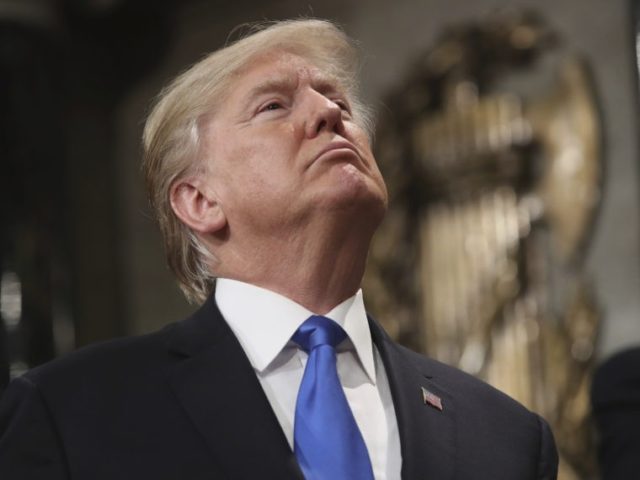President Trump has often been critical of the Chinese government, and it figured prominently in his National Security Strategy (NSS) as a major “strategic competitor” for the United States, but China was only mentioned briefly during his 2018 State of the Union speech Tuesday.
The passage in which Trump did mention China, and Russia, was merely a brief acknowledgment that they represent challenges to “our interests, our economy, and our values.”
“In confronting these dangers, we know that weakness is the surest path to conflict, and unmatched power is the surest means of our defense,” said the president, before asking Congress to end the “dangerous defense sequester and fully fund our great military.”
Trump mentioned China in passing when he described North Korean defector Ji Seong-ho’s courageous escape from that hideous dungeon state. Of course, it was necessary to reference China in order to tell Ji’s story properly, but there is also something of a message to China embedded in the account:
In 1996, Seong-ho was a starving boy in North Korea. One day, he tried to steal coal from a railroad car to barter for a few scraps of food. In the process, he passed out on the train tracks, exhausted from hunger. He woke up as a train ran over his limbs. He then endured multiple amputations without anything to dull the pain. His brother and sister gave what little food they had to help him recover and ate dirt themselves – permanently stunting their own growth.
Later, he was tortured by North Korean authorities after returning from a brief visit to China. His tormentors wanted to know if he had met any Christians. He had – and he resolved to be free.
Seong-ho traveled thousands of miles on crutches across China and Southeast Asia to freedom. Most of his family followed. His father was caught trying to escape, and was tortured to death.
Today he lives in Seoul, where he rescues other defectors, and broadcasts into North Korea what the regime fears the most – the truth.
China has long supported and protected the inhuman evil of the North Korean regime to serve its own selfish interests. China is the gateway to freedom for North Koreans seeking to flee Kim Jong-un’s hell on earth. Beijing has pretensions to global leadership and moral authority that are completely incompatible with its support for the regime in Pyongyang. If anything changed China’s attitude toward helping to rein in Kim’s nuclear program, it was Trump’s diplomacy convincing them that protecting North Korea will henceforth cost them far more than it is worth.
Trump also made an oblique reference to China when he discussed his agenda for international trade.
“The era of economic surrender is over,” he said during the State of the Union. “From now on, we expect trading relationships to be fair and to be reciprocal. We will work to fix bad trade deals and negotiate new ones. And we will protect American workers and American intellectual property, through strong enforcement of our trade rules.”
Intellectual property theft is a charge Trump has often leveled at China. In his National Security Strategy, he said America’s adversaries “steal and exploit our intellectual property and personal data, interfere in our political processes, target our aviation and maritime sectors, and hold our critical infrastructure at risk.”
Later in the NSS, Trump specifically named China as a competitor that steals “U.S. intellectual property valued at hundreds of billions of dollars.” He noted this is not just accomplished through outright theft by hackers, but by using “largely legitimate, legal transfers and relationships.” He warned that China’s “access to the U.S. innovation economy” is driving its military and economic expansion.
To put all that in simpler terms, China aggressively forces American companies to hand over their intellectual property as a form of tribute to gain access to their growing marketplace. Such practices will be difficult to halt as a matter of government policy, since the companies involved willingly pay the price China demands, just as it is difficult to legally prevent American companies from voluntarily submitting to Chinese speech controls.
The Trump administration joined with the European Union in November to argue that China does not deserve “market economy” recognition from the World Trade Organization, because the state still plays such a pervasive role in Chinese economics, distorting prices and harming the actual market economies expected to interface with China. If anything, state power over the Chinese economy is growing again.
The administration has warned that granting market economy status to China would be “cataclysmic” for the WTO. China, in turn, argues that WTO membership automatically immunizes it against anti-dumping measures and other trade protections.
Trump was slightly more outspoken about China in his address to a joint session of Congress in February 2017, which was seen as a sort of “mini-State of the Union” at the outset of his presidency. In that address, he contended that America has “lost 60,000 factories since China joined the World Trade Organization in 2001.”
Still, then as now, President Trump tends to minimize references to China in his major addresses, certainly compared to the criticism he leveled in previous years. This might reasonably be assumed to be part of his diplomatic maneuvers with Beijing regarding North Korea, but even the cursory mention of China in the State of the Union address makes it clear that challenges far beyond North Korea’s nuclear program remain in the U.S.-China relationship.

COMMENTS
Please let us know if you're having issues with commenting.